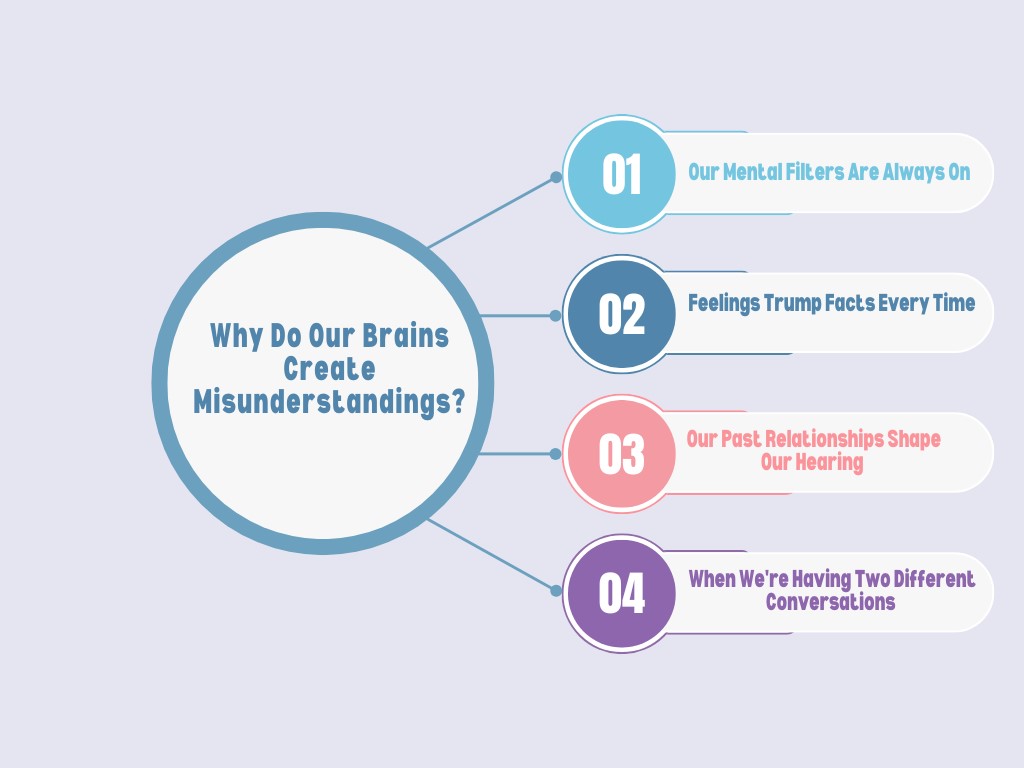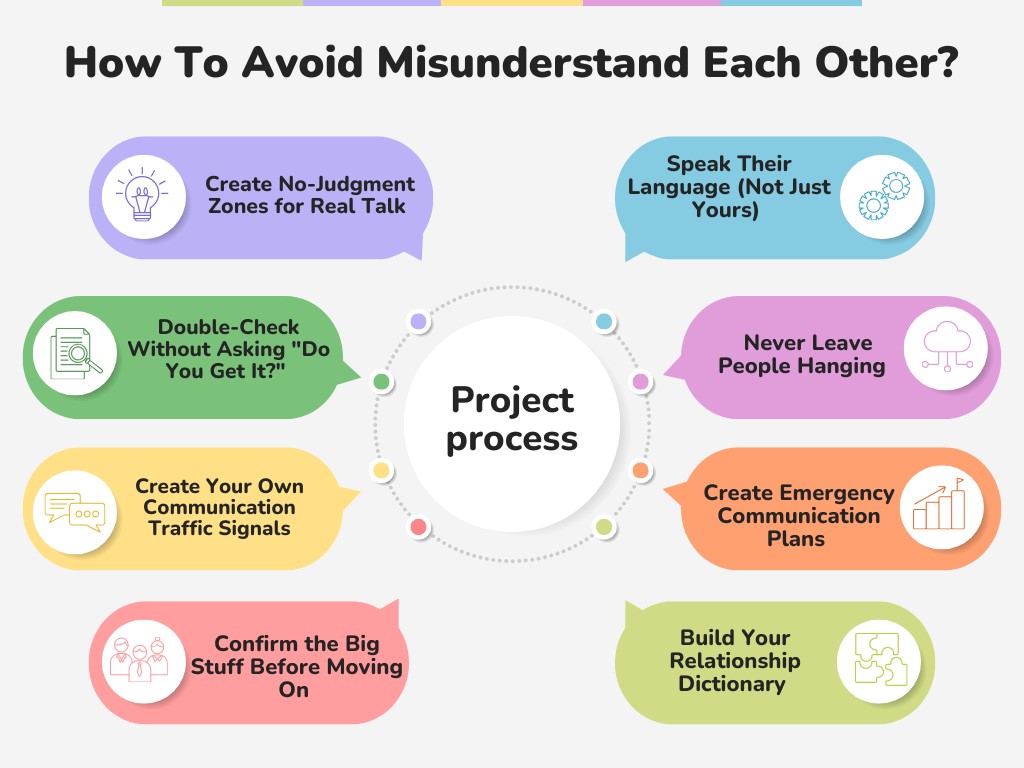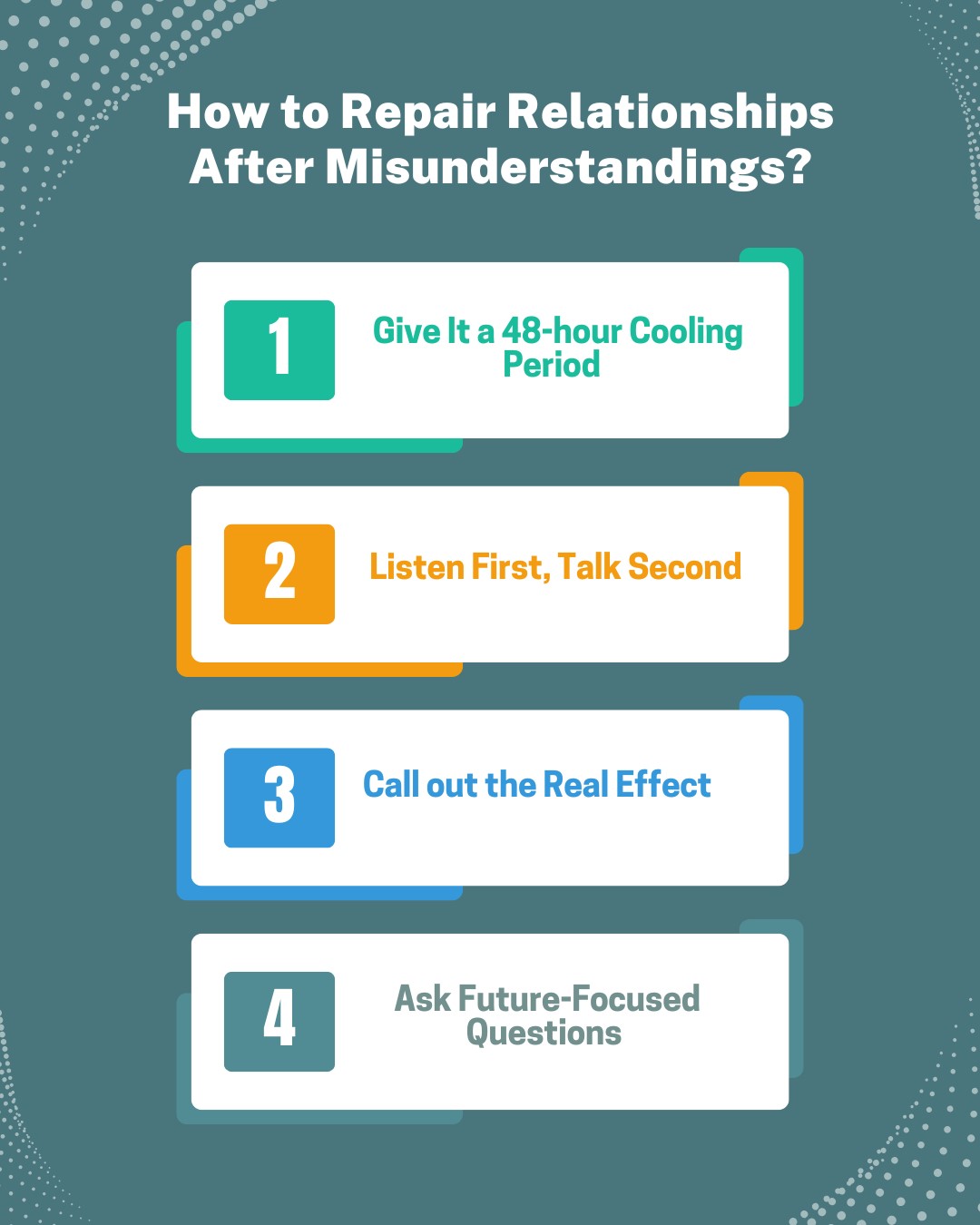Each and every day, we all lose our way and gay into misunderstanding assume. When you think you were being clear, but the word got twisted along the way. Not only is it annoying, but it’s also how our thoughts are wired.
Researchers Gordon and Diamond found that our brains naturally filter everything through our present feelings, past events, and patterns of relationships. As a result, we often talk about very different things without realizing it.
Why Do Our Brains Create Misunderstandings?
Often, two people can hear the same thing but have very different ideas about what it means. Actually, this is based on brain science! Gordon and Diamond found in 2023 that these communication blurs happen naturally in our thoughts.
Our Mental Filters Are Always On
When we take in information, our brains constantly sort it through personal filters:
- We naturally pay attention to things that fit what we already believe.
- For the most part, we fill in the blanks with our own ideas.
- Thompson (2024) says that our memories help us make “mental shortcuts.”
Example: The person you work for texts you, “We need to talk tomorrow.” You might think “promotion coming!” if you’ve been doing great work. But if things have been hard for you, those words might sound like, “I’m about to get fired.”
Feelings Trump Facts Every Time
Communication becomes even harder when feelings are involved:
- In 2023, Gordon and Diamond found that strong emotions can totally overpower what was said.
- Concern, elation, or anger can change neutral words into something completely different.
- Thompson (2024) says that our rational brain is being “hacked” by our emotions.
For instance, if your partner says, “I need some alone time,” it could just mean that they need to rest. The same words, however, may seem like rejection to you if you’re feeling insecure.
Our Past Relationships Shape Our Hearing
Have you ever noticed how some people are always able to tell secret messages in clear language? Thompson discovered in 2024 that previous relationship events affect everything we hear today.
- Mental habits from past interactions act like screens that we can’t see.
- Anytime someone talks to us, these filters go into action instantly.
- These trends can either keep us safe or cause needless trouble, according to Gordon and Diamond (2023).
For example, if your ex-partner always lied about “working late,” you might not trust your current partner when they say they’re staying at the office, even though they haven’t done anything to make you doubt them.
When We’re Having Two Different Conversations
Many misunderstandings happen because we’re talking about different things without realizing it. Gordon and Diamond found in 2023 that communicating effectively means being “in sync,” or on the same wavelength.
- Mind, heart, and even body language are all the same when you’re in sync.
- You might as well be speaking different languages if you don’t have this link.
- These moments of being in sync help relationships get through hard times.
When two people are talking about moving in together, one person might be thinking about the little things, like “How will we split the rent?” while the other person is thinking about the bigger things, like “What will my parents think?” It’s clear to both of them that the other person “just doesn’t get it.”
In moments like these, it’s easy to feel misunderstood — or worse, to pull away emotionally without realizing it. Why Do We Push People Away without Realizing It explores the hidden ways this happens even in close relationships.
How Can Emotional Intelligence Improve Understanding?
When it comes to getting along with others, emotional understanding is the key. As Shi and Wang explain, EI is just being able to recognize and control your own and other people’s feelings.
- Someone with high emotional intelligence (EI) can read between the lines of a talk and tell when something is “off.”
- Jordan found that emotionally intelligent people easily notice feelings that other people don’t notice at all.
Simple Ways to Become More Self-Aware
Knowing yourself is the first step to knowing other people:
- Check your level of emotion: Shi and Wang suggest that you pay attention to how you’re feeling during conversations every day, and this will help you see your own routines.
- Link your texts and moods: Law and Wong found that just thinking about how your mood affects your words can quickly make the way you talk to people better.
If you know that talking about money always makes you stressed, you can take a deep breath before the chat starts.
Figuring Out How Other People Are Feeling
Many times, the real message is in the blanks:
- Be careful of face flashes: Jordan showed that short facial movements, like a frown, can show how someone really feels before they try to hide it.
- Consider the whole picture: Before deciding what someone means, Conte says to think about your past with them and the setting.
- Get the pattern that goes with it: You can tell what someone really means when their words, tone, and body language all match.
4 Communication Mistakes That Mess Everything Up
Communication breaks happen all the time, and most of the time, we don’t even notice. Misunderstandings like these can make relationships difficult and even cause major issues, especially in public places like hospitals or emergency rooms.
As an example of these communication problems, the book “Don’t Be a Crab“ uses everyday life. The book shows how we often fight over things that don’t need to be fought over, like crabs in a bucket pulling each other down.
Six Ways We Trip Over Our Words:
- Neglecting feelings: If a nurse says, “Your test results show high glucose levels,” and doesn’t notice that the patient is becoming more anxious, she misses half of the talk. Ignoring feelings makes people shut down and stop listening, according to Žvelc’s study.
- Assuming that everyone gets it: People have different thoughts when their boss says, “Make this your top concern,” but doesn’t say what that means. Rosenblatt realized that this happens a lot in emails and texts, where you can’t ask, “Wait, what do you mean?” right away.
- Going away without a reason: If someone emails you about something important and you don’t answer for three days without giving a reason, they’re probably already looking for help somewhere else. Rosenblatt found that silences that aren’t explained hurt faith a lot of the time.
- Using wordy phrases that no one can understand: Patients are confused about their health when their doctor says, “You had a myocardial infarction with ventricular involvement” instead of “Part of your heart was damaged during your heart attack.”
How To Avoid Misunderstand Each Other?
Misunderstandings happen to everyone, but there are practical ways to clear the fog. Research shows that a few simple habits can dramatically improve how well we understand each other.
1- Create No-Judgment Zones for Real Talk
Sharing honest thoughts is easier when people don’t fear being judged. Žvelc discovered that giving people set times when they can speak freely without fear of being judged helps them be more honest.
- Try saying, “I’d like to talk about something without being criticized. May I have a talk without any criticism for a moment?”
- These safety zones help people share their deepest feelings and thoughts with others.
- When people feel safe, they don’t try to hide what they mean.
2- Double-Check Without Asking “Do You Get It?”
Asking someone, “Do you understand?” doesn’t work very often because most people will say “yes,” even if they’re not sure. According to Kuehster and Hall, asking someone to repeat what they said cut down on mistakes by 43%.
- Simply asking, “How would this work in your situation?” can quickly clear up any confusion.
- It is especially important to make sure you understand when the conversation is emotional or complicated.
- Saying something like, “Just to make sure we’re all on the same page, what do you think about our holiday plans?” finds mistakes before they become a problem.
3- Create Your Own Communication Traffic Signals
In some cases, words get in the way. According to Žvelc’s study, simple body language can keep small mistakes from growing into big fights.
- Signs can mean “I’m stressed out” or “I need a break.”
- Partners might agree: “Each of us needs a five-minute break if the other touches their ear.”
4- Confirm the Big Stuff Before Moving On
Allow an extra minute to make sure you fully understand what is being said before you speak.
- After you’ve made plans, sum them up briefly: “So you’ll take care of the money while I plan our move. Do you see it that way too?”
- After this last check, there won’t be any, “but I thought you meant…” talks.
- Working a little harder now will save you a lot of trouble later on.
5- Speak Their Language (Not Just Yours)
Brains work in very different ways when they handle information. źvelc found that matching your style to how the other person thinks makes it 30% easier to understand them.
- Watch to see if someone reacts better to words, pictures, or real-life examples.
- Watch the time; some people need to think about what they want to say before they reply.
- Change the way you do things based on what you see.
You could say, “I know you like to think things through before big talks, so I’ve written down my ideas about moving flats. We should talk again tomorrow after you’ve had some time to think about it.”
6- Never Leave People Hanging
If you don’t say anything, people will think the worst. Rosenblatt’s study shows that delays in reaction that aren’t addressed cause worry and bad assumptions that aren’t necessary.
- Simply saying, “I’ll get back to you tomorrow after my deadline,” helps keep relationships stable.
- People will make up stories about why you’re not reacting if you don’t say why.
- A short “Got your message. It’s a busy day, but I will answer properly tonight.” message is helpful.
- Nobody has to guess if you’re avoiding them, mad, or just don’t care if you do this simple thing every day.
7- Create Emergency Communication Plans
Thoughts become cloudy when feelings are strong.
- Plan ahead how you’ll talk to each other during fights.
- Say things that both of you can say, like “I need a break.”
As an example, say, “We’ll use “I” words and not bring up old problems.” It’s easier to talk when you already know what to say when these deals are in place.
8- Build Your Relationship Dictionary
It takes time for each close relationship to build its own language. Having a real “meaning dictionary” helps you avoid saying, “that’s not what I meant!”
- Write down the words that mean different things to each of you.
- Bear in mind words that mean something specific: “I’m fine,” followed by a deep sigh, which means “I’m not fine but need time.”
- Keep your language up to date whenever you learn new ways to communicate differently.
9- Try the Magic 7-Second Pause
What you do first isn’t always the best thing to do. Just seven seconds of quiet before you answer about a touchy subject can totally change the way you talk to each other.
- This short break gives your mind a chance to calm down.
- It’s not too long or too short, just right.
- It keeps us from making snap decisions that we later wish we hadn’t drawn.
For Maya, this is how it worked: When her partner said something about dinner that made her angry, she didn’t argue back. Instead, she counted to seven in her head. In that split second, she understood that her partner wasn’t judging her food but was worried that she was working too hard. What could have been a fight changed into a talk about how to share responsibilities that made everyone feel better.
How to Repair Relationships After Misunderstandings?
Misunderstandings can happen in even the best ties. The good news is that fixing these problems usually makes your link stronger than it was before.
1- Give It a 48-hour Cooling Period
Trying to fix things right away usually makes things worse when you’re feeling annoyed. That’s right—stress hormones make it so that you can’t think straight.
- Your nerves will calm down after 1 to 2 days.
- Take some time to think, not to make your case better.
- Send a message that is friendly and invites a conversation.
For example, if you and your boyfriend had a mistake where he thought you were criticizing his job when you were actually worried about his stress, you could text him, “I’ve been thinking about what we said yesterday, and I honestly believe we both got it wrong.” Would it be okay to talk tomorrow when we’re both home? We need to know this clearly because I care about us.
2- Listen First, Talk Second
When you get together, resist the urge to tell your story. As an alternative:
- Ask them direct questions about how they felt about what happened.
- Try to totally understand their point of view
- Stay quiet and let them talk before you defend yourself.
For example, you could say, “Sarah, I want to know how you felt when we disagreed about holiday plans.” Just wondering how you felt when I told you I wanted to go see my family. “Please don’t stop. I want to understand where you’re coming from.”
3- Call out the Real Effect
Not only should you say “sorry,” you should also say how your actions or words hurt the other person.
- You should be specific about the effects they felt.
- Directly link what you do to how they feel.
- Do not play down or downplay what happened.
Like, “Michael, you missed seeing a place in your favorite neighborhood because I forgot to call you back about the apartment.” That likely made you think that I don’t care about your home search and that you can’t trust me. I can see why you were mad.
4- Ask Future-Focused Questions
Once you know what went wrong, ask a question that looks ahead instead of backward:
- Do not use yes/no, but leave it open-ended.
- Instead of going over problems again, focus on finding answers.
- Highlight how finding a better way will help both of you.
Do something like this: “Aisha, how can we talk about living costs in a way that makes you feel heard and helps me understand what’s important to you financially?”
FAQs
How can I get back on track as soon as possible after a conversation problem?
Say something like, “I think we’re misinterpreting each other,” but don’t say who is to blame. Then, focus on your present goal instead of trying to figure out how the mistake happened.
What’s the best way to talk to someone whose style is completely different from mine?
Start by being clear about how you like to communicate (“I see that I process things out loud while you like to think before saying”). “How can we work with these differences?”) and come up with easy ways to let each other know.
Should I clear up mistakes right away or wait until things calm down?
For small mistakes, it’s best to get clear quickly. But, when things are getting heated, taking a short, clear break (20 to 30 minutes) lets the stress levels drop before trying to solve the problem.










